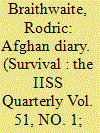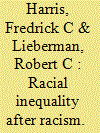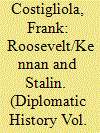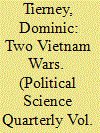|
|
|
Sort Order |
|
|
|
Items / Page
|
|
|
|
|
|
|
| Srl | Item |
| 1 |
ID:
086170


|
|
|
|
|
| Publication |
2009.
|
| Summary/Abstract |
In early September 2008 Rodric Braithwaite travelled to Afghanistan to 'see some of the places (Herat, Pandsher, Salang), talk to some Afghans, and check on the stories my Russian contacts (who go back there all the time) tell me about the positive attitude the Afghans now have towards the Russians'. He kept notes as a record for his own use, and to send back to his family on a daily basis to reassure them that he hadn't been kidnapped. He kindly shared them with Survival, and we present a version abridged to fit the available space. Braithwaite did not meet the kind of people that official visitors to Afghanistan usually meet. He drew a number of conclusions from his conversations:
First, the common belief among Afghans that they were better off under the Russians, and that the last Communist President Najibullah was a better leader than Karzai, may not reflect historical reality; but it bodes ill for the coalition's overall aims. Secondly, the Russian effort in Afghanistan was frustrated above all by their inability to control the frontier with Pakistan: a task which may well turn out to be even harder for the coalition. Thirdly, although the Russians were not defeated militarily in Afghanistan, any more than the Americans were in Vietnam, both the Russians and the Americans failed entirely to achieve their political objectives. The British, by contrast, who ended their nineteenth-century Afghan wars with military victory, sensibly settled for their minimum objective: a monopoly of Afghan foreign policy, which lasted for 80 years. There are no such simple options available today. Finally, there is no certainty that the proposed surge in coalition forces will stabilise the country: the analogy with Iraq is just as false as the earlier analogy between the prospects for democracy in Iraq and what happened in Germany and Japan after 1945.
|
|
|
|
|
|
|
|
|
|
|
|
|
|
|
|
| 2 |
ID:
137566


|
|
|
|
|
| Summary/Abstract |
Last summer, the killings of two unarmed African American men—Eric Garner in Staten Island, New York, and Michael Brown in Ferguson, Missouri—by white police officers reignited the national conversation about racial inequality in the United States. In both cases, grand juries declined to indict the officers involved. The rulings provoked a wave of protest marches, rallies, and road blockades across the country, as demonstrators of all skin colors proclaimed to the nation and to the world that “black lives matter.
|
|
|
|
|
|
|
|
|
|
|
|
|
|
|
|
| 3 |
ID:
163139


|
|
|
|
|
| Summary/Abstract |
It has been easy for Americans to grow angry, exasperated, or disgusted with the Russians, regardless of whether Lenin, Stalin, Khrushchev, Brezhnev, or Putin Was in charge. Think of all the appaling outrages, from the Katyn forest massacre and the mass rapes by Red Army soldiers during World War II, to the repression of Eastern Europe in the cold war, to the more recent aggression against Georgia and Ukraine. Not to mention the Berlin and Cuban crises of a half century ago and the egregious interference in the US election last year. Even during the Grand alliances, the Russians aggravated American sensibilities with their secretiveness and suspicion.
|
|
|
|
|
|
|
|
|
|
|
|
|
|
|
|
| 4 |
ID:
086157


|
|
|
|
|
| Publication |
2009.
|
| Summary/Abstract |
What I remember most about my return to Mexico last year are the narcomantas. At least that's what everyone called them: "drug banners." Perhaps a dozen feet long and several feet high, they were hung in parks and plazas around Monterrey. Their messages were hand-painted in black block letters. They all said virtually the same thing, even misspelling the same name in the same way. Similar banners appeared in eight other Mexican cities that day-Aug. 26, 2008.
|
|
|
|
|
|
|
|
|
|
|
|
|
|
|
|
| 5 |
ID:
163357


|
|
|
|
|
| Summary/Abstract |
HOW DO AMERICANS PERCEIVE AND UNDERSTAND WAR? Dominic Tierney contended that Americans tend to favor interstate wars and support escalation for decisive victory (the “crusade” mind‐set), whereas they oppose nation‐building and counterinsurgency missions in the midst of a civil war and usually view the outcome as a failure (the “quagmire” mind‐set).
The Vietnam War is a valuable case for exploring this claim because the conflict could be perceived as either an interstate war or a civil war. “No question in the entire debate over Vietnam was more hotly disputed than this one,” wrote David Levy, “because both sides could see that the moral authority of the undertaking depended directly upon what was believed.”2 Tierney's theory predicts that Americans who saw the mission primarily as an interstate war will have adopted the crusade mind‐set with a number of positive associated beliefs, including higher levels of support. Meanwhile, Americans who saw the campaign primarily as a civil war will have adopted the quagmire mind‐set with a number of negative associated beliefs, including lower levels of support. In other words, people are expected to have looked at the same essential set of facts about blood and treasure expended but reached very different conclusions depending on which frame they highlighted.
|
|
|
|
|
|
|
|
|
|
|
|
|
|
|
|
|
|
|
|
|